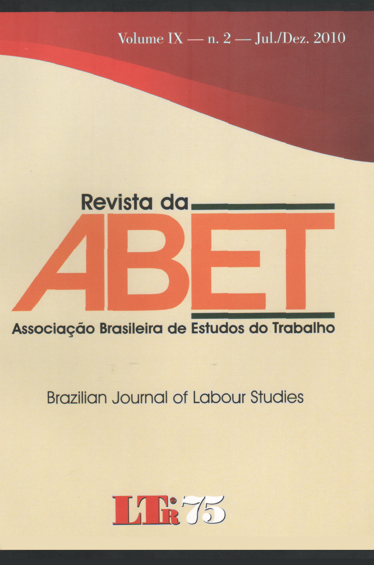FIVE DECADES OF WORKING CLASS STRUGGLE FOR WAGE INCREASES
Abstract
This paper shows how wage adjustment, one of the most important items of the collective negotiations agenda, were held in different political and economical environment. The starting point is the military dictatorship when collective negotiations stopped. Subsequently, with the reopening of the negotiation processes, the 1980’s and the early 1990’s were marked by great difficulties for workers to getting wages increases caused, principally, by Brazilian economy stagnation. The last period, which begins in 1994 and shuts in 2008, has like backdrop the Plano Real and it presents antagonistic results for workers. Up to 2003 most of the results didn’t show any purchasing power increasing. However, since 2004 a significant improvement took place due to syndical movements driven by several factors, such as economic growth, low rates of inflation and democratic environment. After some quite favorable years, the international crisis initiated in 2008 didn’t impact negatively upon wages negotiations, but it brings great doubts for future increases. Information on wage negotiations were originating, in a large extent, from the technical production of DIEESE (Intersyndical Department of Statistic and Socioeconomic l Studies). DIEESE advises trade unions during wage negotiations, among other duties.Downloads
Downloads
Published
How to Cite
Issue
Section
License
Política de Acesso Livre
Esta revista oferece acesso livre imediato ao seu conteúdo, seguindo o princípio de que disponibilizar gratuitamente o conhecimento científico ao público proporciona maior democratização mundial do conhecimento.
Atribuição dos artigos é não comercial (sem derivações 4.0, isto é, Creative Commons) e o acesso é livre e gratuito para download e leitura.
Não há taxa para submissão, avaliação e publicação de artigos.
Copyright
1) Os artigos são de responsabilidade exclusiva dos autores. É permitida sua reprodução, total ou parcial desde que seja citada a fonte.
2) Os trabalhos enviados para publicação devem ser inéditos, não sendo permitida sua apresentação simultânea em outro periódico nacional.
3) Os artigos são submetidos a pareceristas "ad hoc", após prévia avaliação da Comissão Editorial, os quais podem aceitar, recusar ou reapresentar o original ao autor com sugestões para alterações. Os nomes dos pareceristas permanecem em sigilo, bem como os nomes dos autores.
Os Autores que publicam nesta revista concordam com os seguintes termos:
Autores mantêm os direitos autorais e concedem à revista o direito de primeira publicação, com o trabalho simultaneamente licenciado sob a Creative Commons Attribution License, permitindo o compartilhamento do trabalho com reconhecimento da autoria do trabalho e publicação inicial nesta revista.
Autores têm autorização para assumir contratos adicionais separadamente, para distribuição não-exclusiva da versão do trabalho publicada nesta revista (ex.: publicar em repositório institucional ou como capítulo de livro), com reconhecimento de autoria e publicação inicial nesta revista.
Autores têm permissão e são estimulados a publicar e distribuir seu trabalho online (ex.: em repositórios institucionais ou na sua página pessoal), já que isso pode gerar alterações produtivas, bem como aumentar o impacto e a citação do trabalho publicado.
Patrocinador
A publicação recebe financiamento da Associação Brasileira de Estudos do Trabalho.










